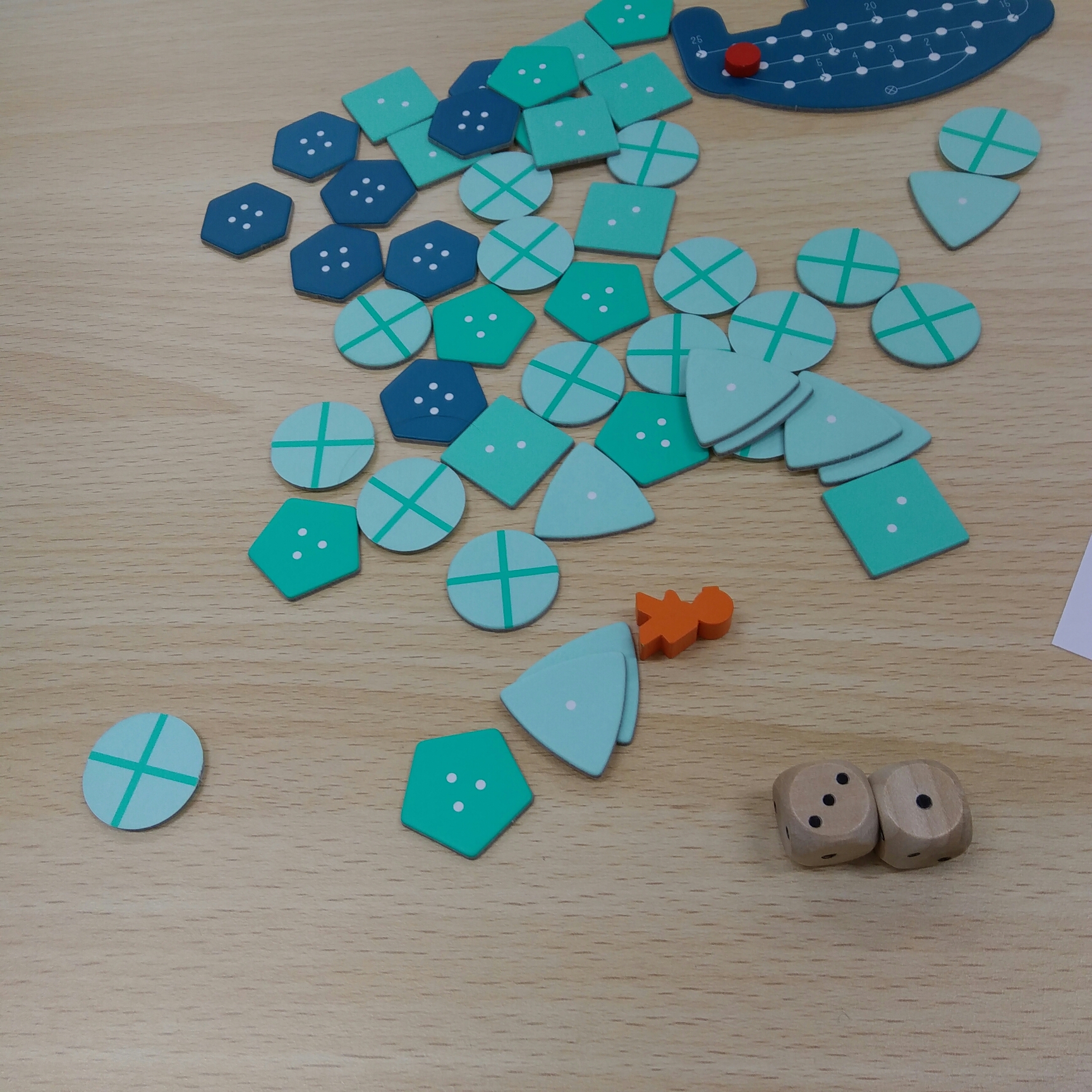Alright. In my curmudgeonly state (usual state), I wrote a post for the lovely Teachers as Workers website. You should join because we should look out for one another in this profession.
Here’s a post on Teacher Education/Training: You don’t need a CELTA, you need a pulse.
"Are you seriously going to do that?"

I’ve been experimenting with board games in the classroom, sometimes in a bit of an impromptu way.
“Seriously, Marc? Aren’t you anti-game?“
No, I’m not; I’m anti time wasting. I’m going to write a bit about things I’ve done with them below. Both, coincidentally, are by Oink Games. They are pocket sized, due to the boards being made up of chips. Both games require collaboration as well as competition, with shifts between both states.
Troll
This is a game of guessing card values and ‘betting’ on the value in order to gain treasure. It’s simple and addictive. The game works by guessing the value of a Troll card only one player has seen and as a group being lower (or not being the individual or one of a couple of individuals that takes the total over the Troll card value) in order to win gems.
I’ve played with children in small groups and in a big university class using teams, and this has tended to work well to encourage English use by penalising unnecessary Japanese use with a one-gem penalty. There’s a tendency to play risky but that’s the fun of the game. There’s negotiation among groups, as well as explanations of betting strategies.
Deep Sea Adventure
This is Troll with movement and is difficult to win points from without a bit of restraint and cooperation.
You go around the board as a diver collecting treasure but there’s an air ration, you only know the approximate value of the treasure and carrying it reduces your own movement and also reduces the air for everyone. Because of the game complexity, there is inbuilt need for communication, like “You can’t move five. You need to go back two because of your treasure.” or “you forgot to move the air meter.” My favourite utterances were a very ladylike “Oh, shit!” and “Are you seriously going to do that?”
Never mind a deep sea adventure, it’s a deep adventure into stuff students never say to one another.
Further reading
Rose Bard’s blog posts tagged with game-based learning.
Japan Game Lab
The Line Between Hare-Brained and Useful

I’ve had this post going on in my head for a while and probably the catalyst for getting it out of my head and into pixels is Sandy Millin’s Incomplete Thoughts post.
I was having a chat with a colleague yesterday and he said, “I don’t know where you get the time for all your ideas.”
“It’s a massive pain in the arse,” I replied, “because I can’t concentrate on other things when something pops up.”
I don’t know if this leads to a condition of not following things through properly, or even just dilettantism but a few things that have got me going all over the internet are:
Open Badges for Accreditation of Some Kind
This blog being about development (ostensibly, though probably more my own), actually having evidence-based accreditation for continuing professional development (CPD) would be a good thing in a landscape of expensive qualifications, cheap qualifications that mean nothing (20-hour internet TEFL courses) and absolutely nothing at all. ITDi provides this, with certificates available and whatnot, too. However, something that can also contribute to teacher-centred, teacher-led teacher development has bugged me for too long. Open Badges seem to sort if fill a gap in that people sit in webinars for certificates but there’s no real proof that they didn’t just leave the laptop on and play games on their phone. How about an open-peer-reviewed bit of writing that helps contribute to the community? Keep your eyes open at #TBLTChat.
Modular Materials
Again, with my Task-Based hat on (which is a beautiful purple crushed-velvet and Kevlar deerstalker), and my ‘I hate coursebooks‘ T-shirt on, how better to address a gap in materials availability than to actually get cracking and make some through refining them. Think less of a Minimum Viable Product than a ‘actually see if students react positively’ approach.
A Co-Op (ad)Venture
I am still investigating the possibility of sorting out a Tokyo/Kawasaki/Yokohama-based co-op of language teachers. Yes, inspired by Serveis Linguistics Barcelona. Viability? Time, Marc? It’s more the client liason that’s a problem but still something I’m looking into. Sometime in 2047.
Some Twitter Hashtags for CPD
So, how-to-use-Twitter-for-CPD articles have been a bit done to death (with some good ones being Lizzie Pinard’s and Sandy Millin’s).

Image: Wikimedia
Anyway, it’s really good to use Twitter for CPD blah blah blah, personal learning network blah blah blah, but you can focus it more by following some hashtags.
In the ELT Bubble Sphere
#ELTchat is a fine wine that only gets better.
#ELTChinwag is the rave your friend’s brother went to while you were asleep.
#KELTchat is a chige, hot, spicy and full of nutrition.
#LINCchat is the poutine you never knew you wanted.
#AusELT is the beach barbecue that your cool friend took you to.
#TBLTchat is that chocolate chip rum and raisin cronut and espresso with mojito aperitif (though I’m biased!)
#tleap is the geodesic dome in the refectory built from breadsticks and cheese.
These are all scheduled chats based on a topic. They occur from time to time.
#tleap is the Michelin starred restaurant with an open dress code and realistic pricing.
This is for English for Academic Purposes teachers, which may not be exclusively for second/foreign language speakers but also native speakers, too.
#ELTwhiteboard is the ice cream you just cannot resist.
This happens often. It is a beautiful, beautiful thing.
Over the fence next door
#edchat is mainstream education stuff. Often tech heavy.
#SEN Special Educational Needs. This is mainly about students with such needs in ‘mainstream’ education. We do not talk about this enough in ELT and we get freaked out when students with diverse needs are put in our classes (especially with little notice, and this happens in language schools as well as academia).
#MFLTwitterati is a hashtag where you can get ideas from people who teach French, German and Spanish (and possibly Chinese).
#langchat is something similar
Hopefully, this will be helpful in pointing out stuff that you didn’t know was there.
Video – Using Padlet with your learners
I had to do a formative assessment on my Using Technology and Corpora unit of my MA at University of Portsmouth. I couldn’t pick a technology that I was going to write about for one of my marked assessments so here is a bit about Padlet.
Who are you? Teacher Identity
This is a post that was meant as a sort of reply to Tyson’s brilliant one and equally brilliant ones by Matthew and Mark. You need to read those. Please. Now or later.

So, who are you or what’s your professional identity?
I’m the one with the chip on my shoulder about my background. Class-conscious but bleeding-hearted. The non-metropolitan. I was a freak at school and it made me feel self-conscious pretty much all the time and the only time I don’t feel like that is when I’m in the classroom.
I grew up the son of a coal miner in a Co. Durham town where ambition meant just living in a bigger house in the same town. My dad left mining after the miner’s strike and then tried a couple of other things before being an oil rigger.
My dad is a man’s man and I am not. I don’t know when we both got to accept that but we didn’t always. Now we do.
My mother would prefer me to live in England but accepts that Japan is home for me now.
Other than this, I got over not being a famous experimental indie guitarist, poet, novelist or bon vivant.
Wow. Sounds like Freud would have a field day.
Quite.
So, what’s your teaching philosophy?
Crikey. Students should learn. Sometimes people can’t be bothered to learn so try and coax them into it. Try not to be an arse about it. I sometimes fail at this last point, if I’m honest with myself.
They say that you teach how you were taught. In that case I think Mrs. Hobley had the biggest impact on me. Constantly demanding us to do our best, being overly strict about it sometimes but being unapologetic and explaining that she got results. I think I do this sometimes with “Your way is not working for you. Try my way because it has worked for me.”
You always sound so nice elsewhere on your blog.
Hmmm. I’m not sure whether I like nice. It seems a bit airy fairy. Like I said, I try not to be an arse.
What are the things that have made you?
Probably not having support as a newly qualified primary teacher and then losing my job made me more tenacious to prove myself. Fatherhood led me to get higher paid work, then freelancing, then getting competitive led me to my DipTESOL which I think was beneficial because it made me question myself and the industry.
Ooh! Hark!
Really. How SLA theory barely gets a nod and a wink in classrooms here. How listening and pronunciation are hard to teach so loads of institutions don’t encourage teachers to actually teach them. How teachers are not provided with development opportunities but institutions are keen as hell to take advantage of a developing teacher. How nobody really gets paid for what they work.My MA I’m studying makes me even more idealistic.

Are you this negative all the time?
No. I love that I help people with their hobby and/or real communicative needs. That I help people do things that they didn’t think they could do. That I have letters in my drawer from students who say I made them realise that they could get better at English and that it wasn’t impossible.
Are you taking the credit for that?
No. I’m taking the credit for helping these people see what they are capable of by using my knowledge and experience to point them in directions they might never have explored otherwise.
Oh, OK.
Look, I know it’s not earth-shattering but it’s what I think.
At least you’re honest. Any advice for other teachers?
Read. Ask questions. Listen to people who seem credible and have evidence as well as opinions.
New Post Elsewhere
So, in spite of feeling sick as a bleeding parrot today, I have good news and good stuff for you to read.
So, over at the ITDi blog, there is a new issue up on Error Correction 2.0, with posts by Chris Mares, John Pfordresher and me. Chris and John talk about meaningful things , making correction nice meaningful, setting goals and such. I get on my high horse about the lack of focus on form regarding pronunciation, pragmatics and discourse awareness/analysis.
Stuff I am Glad I Do as a Freelance Teacher

Those of you who read regularly know just how much of a horrendous curmudgeon I am, and this past couple of weeks I’ve been questioning my career choices, much like Rob Gordon in Nick Hornby’s High Fidelity, when he talks about shutting down his record shop to go and work in a Virgin Megastore.
I have, however, come out the other side of this gnashing of teeth and realised that my relief that life is not all bad was helped by the following things:
Keeping a diary
Not a journal, although I do jot things or add them to a private Google document. No, I’m talking about keeping a detailed schedule and updating it weekly. If I knew I could gather the info as quickly online as I can with paper, I’d use an internet-based calendar but paper is just plain quicker.
Finding how many classes I teach for myself is useful for paperwork for my son’s daycare. It’s also a lot quicker for scheduling new clients.
Speaking Halfway OK Japanese
I had to phone the bank this week and if I hadn’t learned the Japanese I have, getting the information I needed woukd have meant waiting until my wife’s day off or hiring an interpreter or begging the bank to find someone who speaks English.
Spread the risk
I do not work for just one agency, or just one client. This means of one company goes belly up, or if a new client is bloody unreliable, I don’t lose out too much.
This was an issue when I was a mere part-time dabbler, living paycheck to paycheck. I know now that I would never again work for a fly-by-night company who photocopy all their materials. I also know that if I get paid late, somebody doesn’t care about me so what else don’t they care about?
Don’t get me wrong, I’d still love a permanent full-time job with a good salary, it’s just that those are rare as hen’s teeth in EFL and I actually do enjoy my job. It’s just the times people treat you as an idiot that get me cross.
Gritty Politti: Grit, Growth Mindset and Neoliberal Language Teaching
Over the summer, while everyone else was enjoying themselves I was ruing the day I decided to look at grit (Duckworth, 2007) for my Master’s dissertation. I decided it’s unworkable so you get to read about it here.

What is Grit?
Grit is so difficult to define that it takes Duckworth (2016) the best part of a book to describe it adequately. Grit is the orientation of short-term goals toward one’s passions and long-term goals. It has also now mutated, taking on Dweck’s (1996) Growth Mindset, Csikszentmihalyi’s (1990) Flow, Ericsson and Pool’s (2016) Deliberate Practice and become a behemoth. One is left with the impression that only Duckworth truly understands what she means by the term ‘grit’. Grit has also been criticised for not being substantially different to conscientiousness (Kamenetz, 2016). Even Duckworth and Quinn (2009) acknowledge that:
Grit is similar to one Conscientiousness facet in particular, achievement striving, which is measured with items such as “I’m something of a ‘workaholic”’ and “I strive for excellence in everything I do” (Costa & McCrae, 1992a). We believe grit is distinct from achievement striving in grit’s emphasis on long-term goals and persistence in the face of setbacks. However, further research is needed to determine the relationships between grit and other facets of Big Five Conscientiousness.
(Duckworth and Quinn, 2009, p. 173.)
Grit does appear to be lauded, particularly in the USA, for being a commonsense approach to teaching and learning. I do not think this is a good thing. The Grit Score, a short, subjective, Likert-scaled questionnaire, is being used by teachers and learners to assess learners’ grit. One problem here is the weight of the scoring and the disparity between teachers’ and learners’ perceptions. When searching the literature I found nothing. The fact that grit is being used as a magic bullet for the school system’s ills is also worrisome when one might consider the least advantaged actually attending school being a gritty act in itself. Yet, it is these children with poverty-caused cognitive overload (Mani et al, 2013) who will be labelled ‘least gritty’. Duckworth has bemoaned this, much like Frankenstein died at his own monster’s hand.
What negative effects are present? Well, we have teachers buying in to a new orthodoxy dressed up as science, where learners score themselves on how they tend to stick with certain habits. If the teacher is scoring them, so much the worse due to the likelihood of other factors making their way into the scores, such as warmth toward the learners of even empathy towards them. This grit then is used to blame learners or anything but the system, including curricula and syllabi. To me, grit is simply another tool for attacking the poor and the other. They might not be as gritty and it provides an excuse for not targetting financial resources in the classroom, such as teaching assistants, smaller class sizes or taking time to reflect on whole-school issues such as homework, which can effect some learners who may be primary carers. As Thomas (2013) states, “the dirty little secret behind ‘no excuses’ and ‘grit’ is that achievement is the result of slack, not grit.” However, if a lack of achievement can be put down to intrinsic factors within learners, then it provides grounds for ignoring them.
In language teaching, progress is known not to be cumulatively acquired (Lightbown, 1985) yet when language is assumed to be a skill acquired like the learning of facts, it may appear that there is not enough work being done by learners. In adult EFL, language learning may not be the most important part of a learner’s life; even in ESOL, when learners may have to adjust to living in a new country, community and culture, integrative motivation (Gardner & Lambert, 1972) may be lacking. To assume that everyone in a community shares the same values of utility is unwise; to assume language learners progress through stages at the same rate, with the same goals and motivational orientations is to ignore literature and evidence in the classroom.
All of this grit and Growth Mindset then, seems to lend itself to a laissez-faire attitude in the classroom, where what is taught is what is learned, with learners not progressing at the same rate somehow deficient and lacking gumption to catch up. This characterises the grammar syllabus of textbook ELT. However, if one eschewed that, and taught learners English as opposed to teaching English as a subject, one need not abide by or pay lip service to such ideas.
Grit, Growth Mindset and SLA
There is, so far, no research linking grit nor Growth Mindset and SLA. There is research linking motivation, particularly long-term motivation, to SLA. Dweck’s work thus far has looked at problem solving in puzzles yet it may prove to be useful in decreasing the effects of the frequently observed slump in intermediate-level language learners’ development (find and cite).
Dörnyei’s (2009) work on motivational selves has elements of learners orienting themselves toward long-term goals, expectations of others (such as schools, parents, bosses) and visualisation of what would be a possible worst-case scenario if they did not study. This is, in my opinion, compatible with grit but has the benefit of not being burdened with the unnecessary accoutrements of highly subjective data from questionnaires for groups; it is personal.
Duckworth (2016) also talks about building gritty communities yet what if one is alienated from the community of sees oneself as unintegrated in the target community? Seeing as grit is passion and perseverance for a goal, essentially personal, grit may not be the best paradigm to apply to the EFL/EAL/MFL classroom in a compulsory school setting.
Furthermore, developing grit may be an irrelevance. As Norton Peirce (1995) demonstrates in her work with ESL learners in Canada, learners are driven toward communication when needs arise, whether there may be negative affective factors in the immediate environment. This need can drive learning, with Martina, one of Norton Peirce’s learner-correspondents providing anecdotal evidence regarding problems in a part-time job:
In the evening I asked my daughter what I have to tell the customer. She said ‘May I help you’ and ‘pardon’ and ‘something else.’ When I tried first time to talk to two customers alone, they looked at me strangely, but I didn’t give up. I gave them everything they wanted and then I went looking for the girls and told them as usually only ‘cash’. They were surprised but they didn’t say anything.
(Norton Peirce, 1995, p.247)
Rather than nebulous ideas of how to teach or foster grit, self-regulative strategies (Oxford, 2013) could provide a jumping-off point for more effective self study or use of self-access facilities. Such strategies may foster greater motivation by providing learners with alternative ways of working than their current preferences.
One caveat here is that I think grit should be researched; I just don’t think there is a place for it to be brought into classes on a whim due to TED talks bringing a superficial informative lacquer to a few minutes of distraction.
If you disagree, by all means comment. I would love to know more, having spent ages with this.
References
Csikszentmihaly, M. (1990) Flow: The Psychology of Optimal Experience”, New York: HarperCollins ebooks.
Denby, D. (June 21st, 2016) The Limits of Grit. The New Yorker. Retrieved August 22nd, 2016 from: http://www.newyorker.com/culture/culture-desk/the-limits-of-grit
Dörnyei, Z. (2009). The L2 Motivational Self System. In Z. Dörnyei & E. Ushioda (Eds.), Motivation, language identity and the L2 self (pp. 9-42). Bristol: Multilingual Matters.
Duckworth, A. L., Peterson, C., Matthews, M. D., & Kelly, D. R. (2007). Grit: Perseverance and passion for long-term goals. Journal of Personality and Social Psychology, 92(6), 1087-1101.
Duckworth, A. L. & Quinn, P. D. (2009). Development and validation of the Short Grit Scale (Grit-S). Journal of Personality Assessment, 91(2), 166-174.
Duckworth, A. L. (2016) Grit: The Power of Passion and Perseverance. New York: Simon & Schuster.
Dweck, C. (2006). Mindset: The new psychology of success. Random House
Ericcson, A. & Pool, R. (2016) Peak: Secrets from the New Science of Expertise. Boston: Houghton Mifflin, Harcourt.
Gardner, R. C. & Lambert, W. E. (1972) Attitudes and Motivation in Second Language Learning. Rowley, MA: Newbury House.
Kamenetz, A. (May 25th, 2016) MacArthur ‘Genius’ Angela Duckworth Responds To A New Critique Of Grit. Retrieved August 22nd, 2016 from: http://www.npr.org/sections/ed/2016/05/25/479172868/angela-duckworth-responds-to-a-new-critique-of-grit
Lightbown, P. M. (1985) Great Expectations: Second language acquisition research and classroom teaching. Applied Linguistics, 6(2), 173-189.
Mani, A. et al (2013) Poverty Impedes Cognitive Function. Science, 341,(6149), pp. 976-980
Norton Peirce, B. (1995) Social Identity, Investment and Language Learning. TESOL Quarterly 29/1: 9-31. In Seidlhofer, B (ed.) (2003) pp. 236-255. Oxford, New York: OUP.
Oxford, R (2013) Teaching and Researching Language Learning Strategies. Abingdon: Routledge.
Thomas, P. L. (November 10th, 2013) The Poverty Trap: Slack, Not Grit, Creates Achievement. Retrieved August 22nd, 2016 from: https://radicalscholarship.wordpress.com/2013/11/10/the-poverty-trap-slack-not-grit-creates-achievment/
Further Reading
Sheppard, R. (2016) Grit, Resilience and Conation in Adult Esol
Sheppard, R. (2016) Grit, Resilience and Conation in Adult Esol Part II
Seats for my seats
Seating plans: not the sexiest of topics to blog about but here we are after a 12-week action research cycle.
12 weeks, Marc?
12 weeks.
It’s not a big class but if you follow the Pareto principle that 85% of your problems come down to 15% of what’s on your plate then this class is my 15%.
The Learners
Gambit – a boy that can work well but cannot resist fussing about what others do.
Iceman – a boy that thinks he can’t do anything but I’d actually more able than he thinks.
Nightcrawler – a boy who is very literate and able but cannot sit still.
Angel – a boy who has sone kind of autistic spectrum disorder. Highly literate and communicative but also highly disruptive.
Cyclops – a quiet boy of medium ability.
Psylocke – a girl who is quite able but unwilling to try her best in case she falls short of her own benchmark based on others’ work.
Ms. Marvel – a girl who performs well in all skills. Confident but occasionally rushes work too much.
Some things that I found out quickly
The girls need to sit together else Psylocke won’t work.
Psylocke and Gambit distract each other.
Gambit and Angel irritate each other for fun but Angel will scream and occasionally lash out.
Cyclops cannot work near Angel, nor can Iceman. Iceman also cannot work near Nightcrawler.
None of the children like sitting alone very much and anyway, they need to practice speaking English as well as reading and writing.
So, what I did
I used Google Slides to plan my seating each lesson. Often I had one-week notice of absences. I logged any problems and/or changes. Sometimes I noticed huge problems that I had not anticipated, for example that Iceman will work near Gambit, a huge fusspot, but not near Nightcrawler who has a more relaxed temperament. It is not possible to seat Iceman near Cyclops due to Cyclops’ frequent absence.
Strangely, Nightcrawler and Angel make a good seating combination with Cyclops. Iceman and Gambit tend to relax one another, too. While I dislike the idea of boys and girls not sitting together, I am resigned to the girls need to sit together for affective reasons but bring them to work with boys when possible, often Nightcrawler and Cyclops or Angel.
Should this really have taken 12 weeks?
Well, it was more like nine and then three weeks to see if it was final. While ny final plan is not perfect it is good enough and the best possible solution for me and the children.